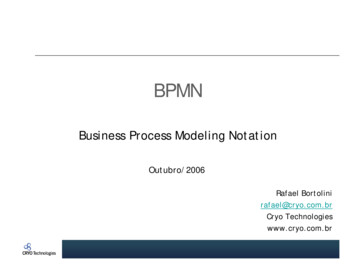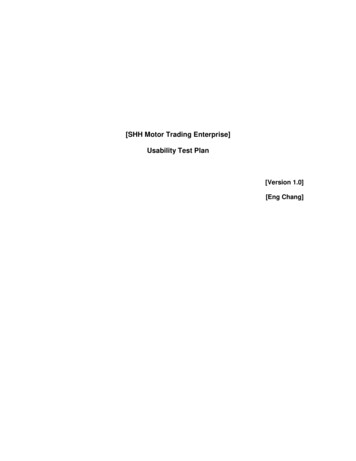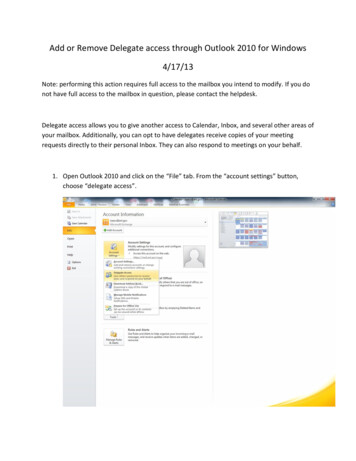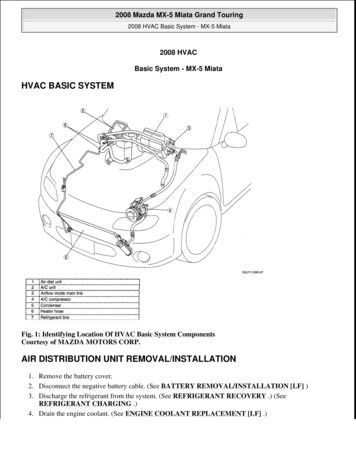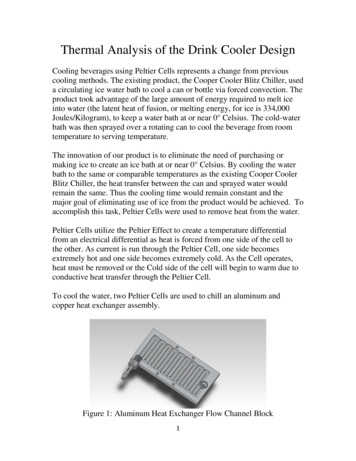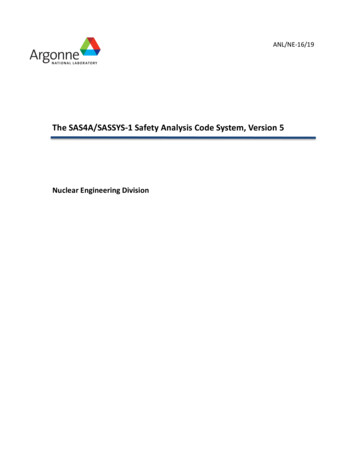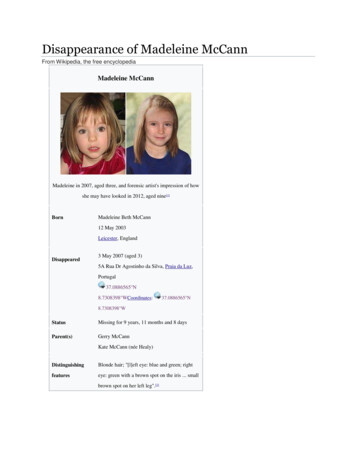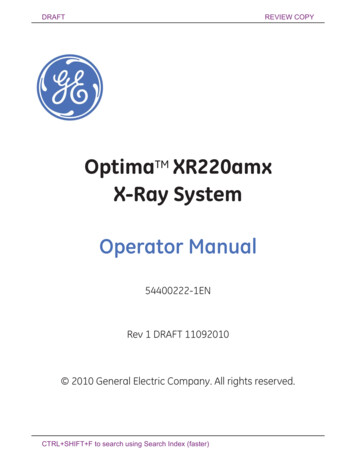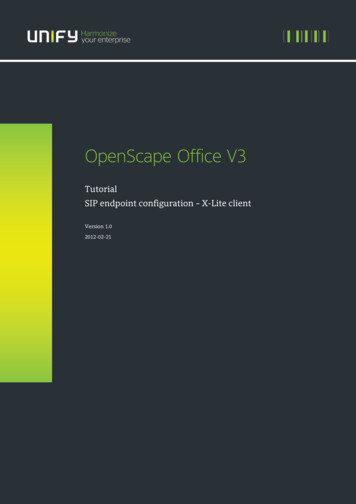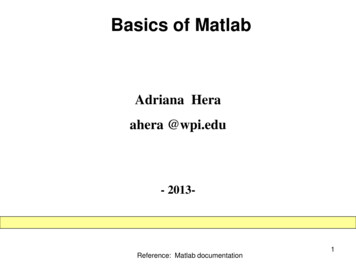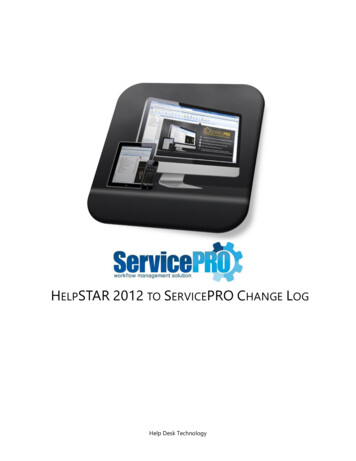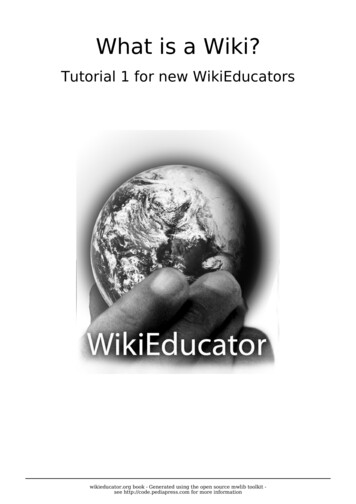
Transcription
What is a Wiki?Tutorial 1 for new WikiEducatorswikieducator.org book - Generated using the open source mwlib toolkit see http://code.pediapress.com for more information
2Introducing a WikiObjectivesIn this tutorial we will: provide an overview of what wikis are, and show some examples of their different uses. discuss the advantages and disadvantages of using wikis to develop content describe the main features of WikiEducatorWhat is a Wiki?The name "Wiki" was chosen by WardCunningham - - the creator of the first Wiki. It isa shortened form of "wiki- wiki", the Hawaiianword for quick.A wiki is a web site that is generally editable byanyone with a computer, a web browser, and aninternet connection. Wikis use a quick and easysyntax to allow users to apply formatting to textand create links between pages. This simpleformatting syntax means that authors no longerneed to learn the complexities of HTML to createcontent on the web.The main strength of a wiki is that it gives peoplethe ability to work collaboratively on the samedocument. The only software you need is anWiki wiki sign outside Honolulu InternationalAirport. (Image courtesy of A. Barataz)Internet browser. Consequently, wikis are usedfor a variety of purposes. If you make a mistake, it's easy to revert back to an earlierversion of the document.All content sourced from WikiEducator.org and is licensed under CC-BY-SA or CC-BY where specified.
3Examples of WikisThe largest and most talked about Wiki on theInternet is Wikipedia[1]Wikipedia is, for the most part, editable byanyone in the world with a computer and aninternet connection and, at the time of thiswriting, contained over 1,500,000 pages. Oneand a half million pages in English! There arealso more than 250,000 articles in German,French, Polish, and Japanese; and more than100,000 articles in Spanish, Italian, Dutch,Portugese, Russian, Swedish, and Chinese. That'sWikis are fun as attested by this WikiEducatornearing 2 million articles or pages! Whileuser from BarbadosWikipedia's mission is to create an encyclopedicresource of knowledge, wikis can be used for a variety of purposes and are quicklybecoming the defacto technology for collaborative group work online. They can be greatsocial tools for classrooms, teams, community groups, or can even be configured to provideeasily updatable web sites for organisations.The following wikis display a range of different applications of wiki technology: Wikitravel[2] - a project to create a free, complete, up- to- date, and reliable worldwide travel guide. WikiWikiWeb[3] - the first ever wiki, it has been around since 1995. eXe Project[4] - an example of how a wiki can be used to run a web site. Auckland.Wiki[5] - a city wiki for the people of Auckland, New Zealand. AKOWiki[6] - an evolving site to provide a bit of help with technology, ideas andteaching to staff in an institution. Lots of single issue pages, not much hyper linking. Scholarpedia[7] - a wiki project based on a system of peer review.There are literally thousands of wikis around the web on a diverse range of subjects andsupporting many communities.All content sourced from WikiEducator.org and is licensed under CC-BY-SA or CC-BY where specified.
4ActivityThe purpose of this activity is to introduce you to a few examples of wiki projects.In this activity you are encouraged to visit at least three of Wikipedia's sisterprojects listed below.For each of the Wikimedia project sites, you should:1.Identify the main purpose of the site and how this differs from Wikipedia2.Skim through at least three representative articles on the site to get a feel forcontributions from the community3.Determine which content license is used for the site.Google three sites from the list of Wikimedia projects below: Wikinews[8] Wikimedia Commons[9] Wikiversity[10] Wikiquote[11] Wiktionary[12] Wikibooks[13]Many of Wikipedia's sister projects were initiated because the encyclopedia was beingcluttered by entries that were not appropriate for an encyclopedia.Interesting uses of Wiki technology British Council Case Study on using a wiki technology to promote collaboration at theoffice. Conference planning, see for example Wikimania 2006 Wiki as an online presentation tool demonstrated by Meredith Gorran Farkas, adistance education librarian. Open Streetmap is a wiki project to provide free geographic data such as street mapsto anyone who wants them. Distinguishing between types of wiki communities - the difference between "abovethe- flow" and "in- the- flow" wikis. The Wealth of Networks WikiNotes - This Wiki is an invitation to collaborate onbuilding a learning and research environment based on Yochai Benkler's book, TheWealth of Networks: How Social Production Transforms Markets and Freedom,available under a Creative Commons Attribution Noncommercial Sharealike license. Other uses include: Meetings (Posting of agendas, prior meeting discussions, minutes) Documentation for collaborative projects Web space for personal note takingIf you find a really interesting use of a wiki - please feel free to add this to the listabove.All content sourced from WikiEducator.org and is licensed under CC-BY-SA or CC-BY where specified.
5URL links in this section[1]http:/ / en.wikipedia.org[2]http:/ / wikitravel.org/ en/ Main Page Wikitravel[3]http:/ / c2.com/ cgi/ wiki?WelcomeVisitors WikiWikiWeb[4]http:/ / exelearning.org eXe Project[5]http:/ / auckland.wiki.org.nz Auckland.Wiki[6]http:/ / akowiki.canterbury.ac.nz AKOWiki[7]http:/ / www.scholarpedia.org/ article/ Main Page Scholarpedia[8]http:/ / en.wikinews.org/ wiki/ Main Page Wikinews[9]http:/ / commons.wikimedia.org/ wiki/ Main Page Wikimedia Commons[10] http:/ / en.wikiversity.org/ wiki/ Wikiversity:Main Page Wikiversity[11] http:/ / en.wikiquote.org/ wiki/ Main Page Wikiquote[12] http:/ / en.wiktionary.org/ wiki/ Main Page Wiktionary[13] http:/ / en.wikibooks.org/ wiki/ Main Page WikibooksAdvantages and DisadvantagesAdvantages anyone can edit easy to use and learn Wikis are instantaneous so there is no needto wait for a publisher to create a newedition or update information people located in different parts of the worldcan work on the same document the wiki software keeps track of every editmade and it's a simple process to revertback to a previous version of an articleIn the old days you had to edit quite complexHTML syntax to create web pages. widens access to the power of web publishing to non- technical users the wiki has no predetermined structure - consequently it is a flexible tool which canbe used for a wide range of applications there are a wide range of open source software wiki's to choose from so licensing costsshouldn't be a barrier to installing an institutional wikiAll content sourced from WikiEducator.org and is licensed under CC-BY-SA or CC-BY where specified.
6DisadvantagesAdvantages in one context, may be disadvantages in another. Anyone can edit so this may be too open for some applications, for exampleconfidential documentation. However it is possible to regulate user access. Open to SPAM and Vandalism if not managed properly. There are easy ways to restorea page however, and on WikiEducator you must be logged in to edit pages so thisreduces vandalism by automated spam bots. Requires Internet connectivity to collaborate, but technologies to produce printversions of articles are improving The flexibility of a wiki's structure can mean that information becomes disorganised.As a wiki grows, the community plans and administers the structure collaboratively.What about quality?Before proceeding with the discussion activity for this tutorial, you should read thefollowing short article.ReadingThere is divided opinion and a healthy debate among educators concerning thequality of content developed in a wiki environment. In your opinion, do you expectto find significant differences in the quality of content when comparing open andclosed authoring approaches? Given the recentness of the wiki phenomenon,research on this question is limited. Can both open and closed authoring modelsproduce high quality material? To find out more, consider the Wikipedia article onthe reliability[1] of articles.The Wall Street Journal Online has an interesting debate between Jimbo Wales of Wikipediaand Dale Hoiberg, editor in chief of Encyclopaedia Britannica, and you may find this to bean interesting read[2] as well.When comparing closed versus open authoring approaches, it is worth looking at thehistory of Wikipedia, which has succeeded in creating the largest encyclopedia in history.Wikipedia was preceded by the Nupedia[3] project, which also aimed to build a free contentencyclopedia. Nupedia was not an open wiki like Wikipedia and adopted an extensiveprocess of peer review before final publication of an article. After 3.5 years, Nupedia hadonly completed 24 Articles, with 74 more articles as work in progress. Clearly thisauthoring model was not scalable, and was a strong motivation for Jimmy Wales, thefounder of Nupedia to open up the authoring model by starting the Wikipedia project.All content sourced from WikiEducator.org and is licensed under CC-BY-SA or CC-BY where specified.
7DiscussionThis activity is designed for participants using these tutorials in a face- to- faceworkshop, or alternatively in an eLearning format with a group of learners. Considerthe following questions, which can be discussed in small groups or using an onlinediscussion forum: Do you have any concerns about the quality of educational resources developedusing an open authoring approach? If so, what are your concerns? If not, howdoes an open authoring approach contribute to high quality learning materials? In your opinion, should course development for education use closed or openauthoring approaches? Give reasons for your view? What mechanisms can be adopted to assure quality of educational contentdeveloped in Wiki environments?Concluding thoughtsReflectionAm I still concerned about the openness of wiki editing? What is to prevent such a website from anarchy? How does a wiki protect my authorship? What if someone deletes my work?Matt Barton, provides a candid yet light hearted response to your concerns in a posting[4]on a list, which is repeated here for convenience of access. Matt says:"They [wikis] will not help a writer develop a personal voice. They will, however,enable collaboration and teach us all something very important about what a truedemocracy is all about.So, if wikis elide all claims to authorship, offer no protection of material, and allow any5- year old child or racist bigot to edit a page, what good are they? Well, let us explorewhy so many wikis are able to flourish in the well- fertilized fields in which they aresown.For one thing, wikis are not really as vulnerable as you may think. They are at least aswell- protected as your home. Now, I beg you to consider: Is your home reallyinvulnerable? Couldn't a small group of hoodlums take it into their minds to vandalizeyour home? How is that you are able to drive a car at all, since anyone with a fiftycent pocketknife could slash your tires wherever you park it?You may say that the police are there to prevent such things. However, I'm looking outmy apartment window now at my tiny little Mazda Miata. There are no uniformedpeople about. However, there are some neighbors. Hopefully they would notice ifsomeone was deflating one of my tires and do something about it.Wikis work under the same model. In wikipedia, authors can choose to "subscribe" to awiki page, which means they are notified via email when anyone tries to change aAll content sourced from WikiEducator.org and is licensed under CC-BY-SA or CC-BY where specified.
8page. They are free, of course, to re- visit the page and investigate. If someone haswritten something disagreeable, it's a small effort to change it back. You see, wikis donot only save one version of a page, but every version. Each time a user saves a newversion, the old version is stored in a database where it can be accessed by examiningthe "History" of the page.Thus, while wikis by default display the top layer of each page, one can easily dig downinto the underlying layers and examine the sediment there. What one finds is thathighly controversial topics (like abortion) are often loaded with hundreds of layers,whereas boring topics like "comma usage" are typically left alone after three or fourchanges.In short, wikis are protected not by code, or by law, but rather by the participation ofan active wiki community. If you are proud of your entry, you will feel compelled to seewhat's up if you receive a notification that the entry has been changed, and "roll itback" if it's obvious the page was vandalized or rendered less intelligent."URL links in this section[1]http:/ / en.wikipedia.org/ wiki/ Reliability of Wikipedia[2]http:/ / online.wsj.com/ public/ article/ SB115756239753455284A4hdSU1xZOC9Y9PFhJZV16jFlLM 20070911.html?mod blogs[3]http:/ / en.wikipedia.org/ wiki/ Nupedia[4]http:/ / www.mattbarton.net/ tikiwiki/ tiki- read article.php?articleId 4Introducing WikiEducatorThe WikiEducator familyWikis are about communities - - not the technology thatenables them. Social communities develop aroundprojects and ideas. For instance, the Wikipediacommunity is working together to build a free onlineencyclopedia. These communities are drawn togetherby a common set of values.WikiEducator[1] was launched by the Commonwealthof Learning[2] in 2006. It provides free eLearningcontent that anyone can edit and use. WikiEducatorwas introduced at the Virtual University for SmallStates of the Commonwealth (VUSSC) coursedevelopers' meeting in Mauritius in August 2006. It isMediawiki logonow being used extensively for the development of freeeducational resources around the world.Many wiki communities believe that content should be free. The slogan of the Mediawikisoftware, which runs WikiEducator and all the projects of the Wikimedia foundation,encap
WikiWikiWeb[3] - the first ever wiki, it has been around since 1995. eXe Project[4] - an example of how a wiki can be used to run a web site. Auckland.Wiki[5] - a city wiki for the people of Auckland, New Zealand. AKOWiki[6] - an evolving site to provide a bit of help with technology, ideas and teaching to staff in an institution. Lots of single issue pages, not much hyper linking.File Size: 746KBPage Count: 14
